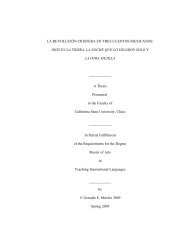View/Open
View/Open
View/Open
Create successful ePaper yourself
Turn your PDF publications into a flip-book with our unique Google optimized e-Paper software.
Why CHAMPS/Life Skills?<br />
The NCAA CHAMPS Alcohol Choices and Addictive Behaviors course<br />
(ACAB) was just one of a myriad of resources developed by the NCAA to provide to<br />
member institutions that are part of the CHAMPS/Life Skills program. The program was<br />
developed from the vision of NCAA Division I Athletic Director’s Association Executive<br />
Director Gene Hooks during the 1991-92 academic year, and the NCAA Foundation’s<br />
Life Skills Program. The programs merged into the CHAMPS/Life Skills program in the<br />
1994-95 academic year (1A Athletic Directors’ Association, n.d.b.).<br />
Prior to the merger and under the tutelage of Hooks, the CHAMPS program<br />
was recommended because it helped fulfill part of the 1A Directors’ mission. Included in<br />
the mission were the following statements:<br />
Division 1A directors of athletics are dedicated to the welfare and future success of<br />
the student-athletes, which we serve. It is imperative that the programs operated by<br />
the athletic director reflect well on the institution, and that teams representing the<br />
institution bring honor and respect to the campus. Athletic directors are committed<br />
to provide the coaching, facilities, and equipment necessary for each student-athlete<br />
to achieve his or her potential as a person, student, and athlete. We must also be<br />
committed to the prevention of drug and alcohol abuse and gambling dangers, and<br />
provide every possible means of testing, education, and follow-up. (1A Athletic<br />
Directors’ Association, n.d.c.)<br />
The program was also viewed as an aid to help athletic directors fulfill their<br />
stated values and ethics, on which each athletic director agrees to place the highest value<br />
and promote with each decision they make (1A Athletic Directors’ Association, n.d.a.).<br />
The first value listed was the overall welfare of each student athlete, which included<br />
health, safety, personal growth, and educational and athletic development. Within this<br />
framework of student-athlete welfare a code of ethics existed that included a list of<br />
principles to be addressed. These principles included physical development, health, and<br />
30




